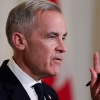Vice President JD Vance told military academy graduates on Friday that President Donald Trump wants to make sure U.S. troops are only sent into danger when there are clear and specific goals, not vague or never-ending missions like in the past.
In his speech at the U.S. Naval Academy, Vance said Trump’s strategy “doesn’t mean that we ignore threats but means that we approach them with discipline and if we send you to war, we do it with a very specific set of goals in mind.”
He explained that Trump prefers short, targeted military actions, referring to a recent airstrike Trump ordered—then paused—against Houthi rebels in Yemen.
“That’s how military power should be used,” he said. “Decisively with a clear objective.”
This was Vance’s first time speaking as vice president at a military service academy. He briefly spoke about his own background while addressing the 1,049 graduates of the class of 2025 in Annapolis, most of whom are now newly commissioned officers.
Vance, from Ohio, joined the Marine Corps after finishing high school. He served four years, including time in Iraq, and worked as a military journalist.
He appeared to question the value of the Iraq War while talking about Trump’s different strategy. Referring to his own service, he said: “How hard could it be to build a few democracies in the Middle East? Well, almost impossibly hard, it turns out. And unbelievably costly.”
Vance also criticized the Biden administration’s effort to build a pier in Gaza to deliver aid during Israel’s conflict with Hamas. He suggested the plan didn’t work.
“The Trump administration has reversed course,” Vance said. “No more undefined missions. No more open-ended conflicts.”
He added, “We ought to be cautious in deciding to throw a punch, but when we throw a punch, we throw a punch hard, and we do it decisively. And that’s exactly what we may ask you to do.”

Speaking ahead of Memorial Day, Vance reminded everyone that the day is “not a happy day” and “not for those who served and came home. It is for those who served and didn’t.”
“Every Memorial Day, I think about a graduate of this institution, Major Megan McClung,” Vance said. “She was an officer I served with who was bright, tough and incredibly dedicated to her job.” He said McClung arrived in Iraq shortly before he did and was killed not long afterward.
“She loved this institution,” Vance said. “And, like so many who came before her, she built on its legacy in the way that she served her country.”
McClung, 34, was a public affairs officer who died from a roadside bomb in Ramadi in December 2006. She was the first female Marine officer and the first female Naval Academy graduate to be killed in the Iraq War.
Vance served in the Marines, and when he became Trump’s running mate last year, he was the first veteran to be on a major party’s presidential ticket since John McCain in 2008. The last U.S. president with military service was George W. Bush, who left office in 2009.
Each year, the president and vice president give speeches at one of the military academies. Trump is set to speak at West Point’s graduation on Saturday.
Lillian Huong, a 22-year-old from Sacramento, California, who is now a second lieutenant in the Marines, said before the speech that she respected the vice president’s military background and hoped to hear “some good leadership advice.”
“It’s an honor to hear him speak and be a part of the same community as him,” she said.
Some students were focused on the big milestone in their lives.
“It’s just an exciting day regardless of who the speaker is,” said Sierra Paoli, a 25-year-old from Los Angeles. She said it had been her dream, and her late father’s dream, for her to graduate from the Naval Academy. She enrolled more than three years after joining the Navy.
“I think my family is just excited to see this whole thing,” she said.


